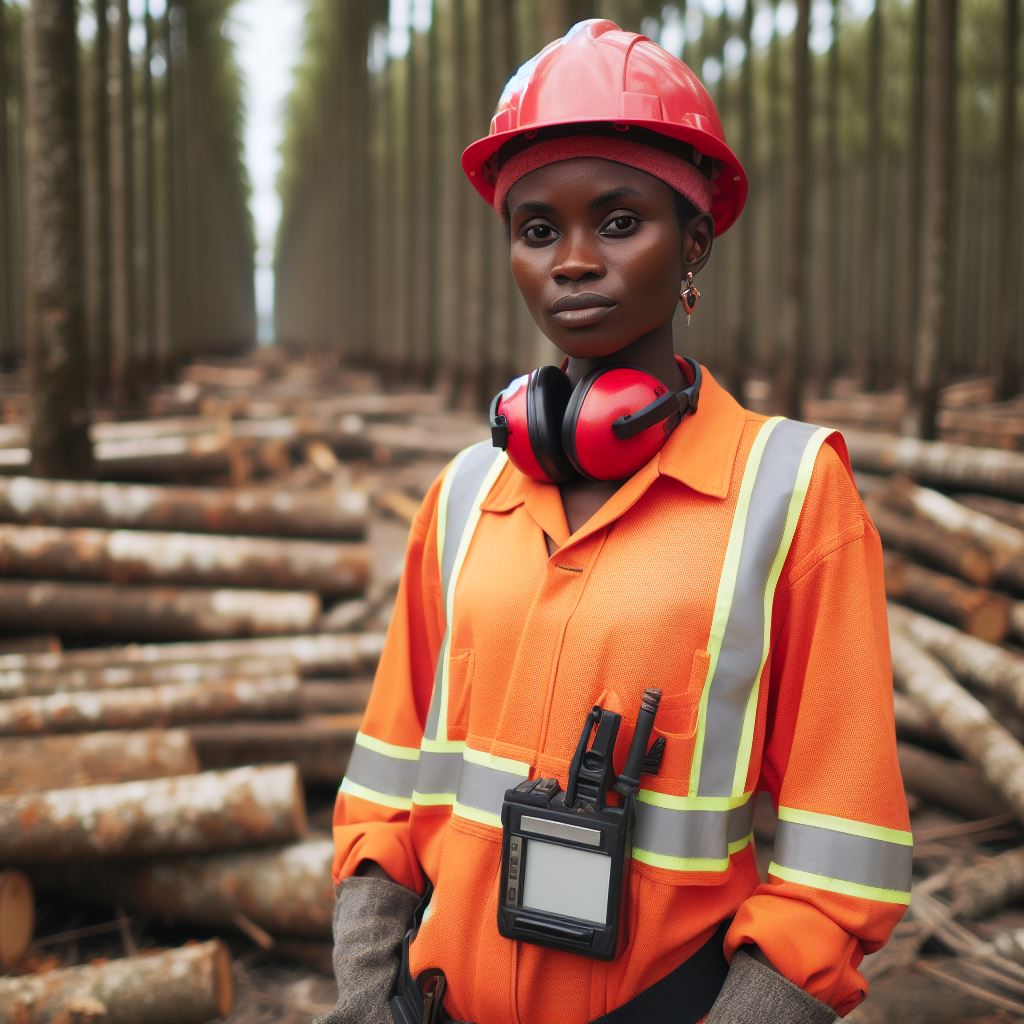Introduction
This blog post will explore Field Work and Practical Training in Nigerian Forestry Schools.
Fieldwork and practical training play a vital role in Nigerian forestry schools in several ways.
Firstly, these experiences provide students with practical knowledge and skills that are essential for their future careers in forestry.
Furthermore, hands-on experience complements theoretical knowledge by allowing students to apply what they have learned in real-world situations.
By engaging in fieldwork, students have the opportunity to observe and interact with different forestry ecosystems, enhancing their understanding of how these ecosystems function and how they are managed.
This direct exposure to the field also enables students to develop important skills such as data collection, analysis, and problem-solving, which are crucial in forestry research and management.
Moreover, fieldwork and practical training help students develop a sense of responsibility towards the environment.
Working in the field enables students to witness the impacts of human activities on natural resources firsthand, leading to a deeper appreciation for the importance of sustainable forest management.
Additionally, fieldwork promotes teamwork and collaboration among students.
As they work together to solve challenges and complete tasks, they learn how to communicate effectively and cooperate with their peers.
These skills are invaluable in the professional world, where collaboration and teamwork are essential for successful forest management projects.
In essence, fieldwork and practical training have immense relevance in Nigerian forestry schools, providing students with essential skills, practical knowledge, and a sense of environmental responsibility.
Hence, these experiences must be prioritized and integrated into the curriculum to ensure well-rounded and competent forestry graduates.
Importance of Fieldwork in Nigerian Forestry Schools
Fieldwork plays a crucial role in Nigerian forestry schools, providing practical skills essential for real-world scenarios.
It allows students to apply classroom knowledge in diverse environments, dealing with actual challenges they may encounter in their careers.
Understanding Ecological Processes and Natural Resource Management
Engaging in fieldwork enables students to gain hands-on experience in observing and studying ecological processes.
They get to witness the dynamics of ecosystems firsthand, learning about the relationships between organisms and their environment.
Nigerian forestry schools often emphasize sustainable natural resource management.
Fieldwork provides an opportunity for students to see the practical applications of managing forests, wildlife, and other resources effectively.
Through this experience, they learn about the importance of balance in preserving and utilizing natural resources.
Developing Critical Thinking and Problem-Solving Abilities
Fieldwork challenges students to think critically and find solutions in real-time.
They encounter various situations that require immediate decision-making and adaptability.
This process helps them develop problem-solving skills necessary for their future careers in forestry.
During fieldwork, students face unexpected obstacles, such as difficult terrain, weather conditions, or encountering wildlife.
Overcoming these challenges strengthens their ability to think on their feet and find innovative solutions.
Enhancing Practical Skills for Real-World Scenarios
Fieldwork allows students to acquire practical skills that cannot be obtained solely through theoretical education.
They learn how to operate tools, collect data, and utilize techniques applicable to forestry, such as tree identification, measuring biomass, and conducting biodiversity surveys.
Working in the field also improves students’ communication and teamwork skills.
They learn how to collaborate effectively with their peers, local communities, and professionals in the forestry sector.
This practical experience prepares them for the requirements of future forestry projects and initiatives.
Applying Classroom Knowledge in Real Environments
Fieldwork bridges the gap between theory and practice, showcasing the relevance of classroom knowledge in real environments.
Students witness how concepts they learn in lectures are applied practically.
This connection strengthens their understanding and retention of theoretical concepts.
It also allows students to develop a comprehensive perspective on the challenges and complexities of forestry.
Students gain insights into the multidisciplinary nature of the field, recognizing the interconnectedness between environmental, social, and economic aspects of forestry.
Fieldwork is an essential component of education in Nigerian forestry schools.
It provides the groundwork for practical skills, critical thinking, and problem-solving abilities.
Students gain firsthand experience in ecological processes and natural resource management, preparing them for successful careers in the forestry sector.
Read: Comparing Forestry Curriculum: Nigeria vs. Global Standards
Practical Training in Nigerian Forestry Schools
In Nigerian forestry schools, practical training is an integral part of the curriculum.
Transform Your Career with Expert Guidance
Get personalized mentorship consulting that’s tailored to your unique path. Our expert advice is actionable and exclusive.
Get StartedIt provides students with hands-on experience and skills necessary for a successful career in forestry.
The types of practical training offered in these schools vary and include fieldwork, laboratory exercises, and workshops.
Integration of Practical Skills into the Curriculum
Forestry schools in Nigeria recognize the importance of practical skills and ensure their integration into the curriculum.
This integration allows students to apply theoretical knowledge to real-life situations, enhancing their understanding and competence in forestry practices.
During the course of their training, students engage in various practical exercises and activities that simulate real-world scenarios.
These activities aim to develop their problem-solving abilities, critical thinking skills, and teamwork, all of which are essential in the field of forestry.
Practical Exercises and Activities Undertaken During Training
Practical training in Nigerian forestry schools involves a range of exercises and activities.
These include tree identification and measurement, forest inventory and assessment, nursery establishment and management, and forest plantation establishment.
Students also learn techniques for soil analysis and assessment, pests and diseases control, seed collection and storage, and forest fire prevention and management.
These hands-on activities provide students with a comprehensive understanding of forestry practices and instill in them the necessary skills to manage and conserve forests effectively.
Resources and Equipment Available for Practical Training
Nigerian forestry schools provide students with access to various resources and equipment needed for practical training.
These include field accessories such as compasses, measuring tapes, clinometers, and GPS devices for accurate data collection and analysis during fieldwork.
Laboratories are equipped with modern tools and equipment for soil analysis, seed testing, and microscopy.
In addition, workshops are conducted to familiarize students with the operation and maintenance of forestry machinery and equipment, such as chainsaws and brush cutters.
The availability of these resources and equipment ensures that students gain practical experience using industry-standard tools and technologies, preparing them for the challenges they may encounter in their future careers as forestry professionals.
In fact, practical training in Nigerian forestry schools is crucial for students to acquire the necessary skills and experience in the field.
The integration of practical skills into the curriculum and the range of exercises and activities undertaken during training contribute to a comprehensive understanding of forestry practices.
With the availability of resources and equipment, students are well-prepared to tackle real-life challenges in their future careers as forest managers and conservationists.
Read: Key Research Areas in Forestry: Nigeria’s Contribution to Science
Fieldwork Challenges in Nigerian Forestry Schools
Common challenges faced during fieldwork in Nigerian forestry schools
In Nigerian forestry schools, fieldwork poses several challenges that students must overcome in order to gain practical experience. These challenges include:
- Limited resources: Nigerian forestry schools often lack adequate funding and equipment for fieldwork, hindering students’ ability to carry out their tasks effectively.
- Poor infrastructure: The lack of proper roads and transportation makes it difficult for students to access remote forest areas for fieldwork.
- Unpredictable weather: Nigerian forests are known for their unpredictable weather patterns, which can pose challenges for students conducting fieldwork.
- Wildlife encounters: Forests are home to a variety of wildlife, some of which can be dangerous. Students must be cautious and take necessary safety precautions.
- Health and safety risks: Forest environments can present risks such as falling trees, uneven terrain, poisonous plants, and insect bites. Students need to be vigilant and follow safety protocols.
- Limited access to facilities: Remote forest areas may lack basic facilities such as clean water, electricity, and sanitation, making it challenging for students to carry out their fieldwork.
- Communication difficulties: In remote forest areas, students may face challenges in communicating with their peers and instructors, hindering collaboration and learning.
- Time constraints: Fieldwork often requires spending extended periods of time away from the school, which can create scheduling conflicts with other academic responsibilities.
Addressing these challenges
To address these challenges, proper planning and logistics are essential.
Schools should invest in appropriate resources and equipment for fieldwork, ensuring that students have access to necessary tools.
Adequate funding should be allocated to maintain infrastructure and roads leading to remote forest areas.
Moreover, safety considerations should be a top priority.
Students should receive training on wilderness first aid, and instructors should ensure that safety protocols are followed.
This includes carrying appropriate safety gear, conducting risk assessments, and implementing emergency response plans.
Accessing remote forest areas can be difficult due to the lack of proper transportation.
Schools should explore partnerships with forestry agencies and local communities to provide reliable transportation options for students.
Additionally, the use of technology, such as drones and GPS systems, can help students navigate through challenging terrains.
In short, fieldwork in Nigerian forestry schools comes with its own set of challenges.
Limited resources, poor infrastructure, unpredictable weather, wildlife encounters, health and safety risks, limited access to facilities, communication difficulties, and time constraints are all factors that need to be addressed.
By focusing on proper planning, logistics, safety considerations, and improving access to remote forest areas, Nigerian forestry schools can enhance the fieldwork experience for students and develop competent forestry professionals.
Read: Career Prospects in Forestry: Opportunities in Nigeria & Beyond

Strategies for Effective Fieldwork and Practical Training
Preparing and Organizing Fieldwork Assignments
- Develop a clear objective and plan for each fieldwork assignment to maximize learning outcomes.
- Ensure all necessary equipment and materials are prepared and available before starting the fieldwork.
- Conduct thorough research and gather relevant information about the field site to familiarize yourself with the environment.
Importance of Safety Protocols and Risk Assessment
- Prioritize safety by conducting a comprehensive risk assessment before engaging in any fieldwork activities.
- Implement safety protocols such as using personal protective equipment and following emergency procedures.
- Regularly communicate and update team members about potential hazards and how to mitigate them.
Significance of Collaboration and Teamwork during Fieldwork
- Foster a collaborative environment by encouraging open communication and sharing of ideas among team members.
- Allocate roles and responsibilities based on each individual’s strengths and expertise to enhance efficiency.
- Establish effective teamwork strategies to ensure smooth coordination and problem-solving during fieldwork.
Integration of Technology and Modern Tools in Fieldwork Exercises
- Utilize technological advancements such as GPS devices and mapping software to enhance data collection and analysis.
- Incorporate drones and remote sensing technologies to gather information from inaccessible or hazardous locations.
- Explore the use of mobile apps and online platforms for data recording, analysis, and collaboration among team members.
In general, effective fieldwork and practical training in Nigerian forestry schools require careful preparation, adherence to safety protocols, collaboration among team members, and the integration of technology.
By following these strategies, students can maximize their learning experience and contribute to the development of sustainable forestry practices.
Read: Top Nigerian Universities Offering Forestry and Their Rankings
Gain More Insights: Why Study Agricultural Admin in Nigerian Institutions?
Case Studies of Successful Fieldwork and Practical Training in Nigerian Forestry Schools
Notable Fieldwork Projects or Practical Training Programs
- In-depth study of forest ecosystems in Obudu Mountain Range.
- Community forestry project in collaboration with local communities in Cross River State.
- Assessment of timber production and sustainable harvesting practices in Ondo State.
- Research on forest fire prevention and management techniques in Niger State.
- Participatory mapping of forest resources for effective conservation planning.
Positive Outcomes and Impacts of these Initiatives
The above fieldwork projects and practical training programs have yielded numerous positive outcomes and impacts:
- Enhanced knowledge and understanding of forest ecosystems and their conservation.
- Improved skills in sustainable forest management and timber production practices.
- Increased community engagement and participation in forest conservation efforts.
- Development of effective forest fire prevention and management strategies.
- Creation of comprehensive forest resource maps for informed decision-making.
Benefits to Students’ Understanding of Forestry Practices
The experiences gained from these fieldwork projects and practical training programs have greatly benefited the students of Nigerian forestry schools. Some key benefits include:
- Practical application of theoretical knowledge learned in the classroom.
- Exposure to real-world challenges and opportunities in forestry management.
- Enhanced critical thinking and problem-solving skills in forestry-related issues.
- Improved ability to work collaboratively in multidisciplinary teams.
- Development of strong fieldwork and research skills for future endeavors.
Impact of these experiences
Moreover, these experiences have allowed students to deepen their understanding of the complexities and nuances of forestry practices.
They have gained firsthand experience in applying scientific principles and techniques to solve real-world problems.
The fieldwork projects and practical training programs have also exposed students to the social, economic, and environmental aspects of forestry.
This holistic perspective enables them to grasp the interconnectedness of various factors influencing forest management.
Furthermore, the positive outcomes and impacts of these initiatives have instilled a sense of responsibility and appreciation for sustainable forestry practices among the students.
They have witnessed firsthand the positive effects of community involvement and participatory approaches in conserving and managing forest resources.
In review, the case studies presented here demonstrate the effectiveness of fieldwork projects and practical training programs in Nigerian forestry schools.
These initiatives have not only expanded students’ knowledge and skills but also contributed to their personal and professional growth.
The experiences gained have equipped them to tackle the challenges of sustainable forest management and conservation in their future careers.
Conclusion
Field work and practical training play a crucial role in Nigerian forestry schools.
Through hands-on experience, students gain valuable skills that shape their future as forestry professionals.
This practical aspect of education cannot be overlooked, as it provides real-life scenarios where theoretical knowledge is applied.
Field work allows students to interact with different forest ecosystems, understand their dynamics, and learn conservation techniques.
Practical training enhances critical thinking, problem-solving, and decision-making skills, which are essential in the forestry industry.
By engaging in field work, students become familiar with various tools, technologies, and techniques used in forestry practices.
They develop teamwork and communication skills, as they collaborate with fellow students, researchers, and experts.
The exposure to real-world challenges prepares them to tackle similar situations they will encounter in their careers.
Forestry education should not be limited to the classroom.
Prospective students are encouraged to consider the practical aspects, as they will shape their abilities to contribute effectively to the field.
Field work and practical training are of utmost importance in Nigerian forestry schools.
They provide students with hands-on experience, valuable skills, and real-life scenarios that shape their future as forestry professionals.




